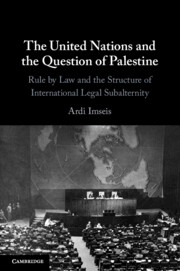 The United Nations and the Question of Palestine
The United Nations and the Question of Palestine Book contents
- The United Nations and the Question of Palestine
- The United Nations and the Question of Palestine
- Copyright page
- Dedication
- Contents
- Maps
- Foreword
- Preface
- Acknowledgements
- Table of Cases
- Table of Treaties and International Instruments
- Abbreviations
- 1 Introduction
- 2 The Interwar Period
- 3 1947: The UN Plan of Partition for Palestine
- 4 1948 and After: The UN and the Palestinian Refugees
- 5 1967 and After: The UN and the Occupied Palestinian Territory
- 6 2011 and After: Membership of Palestine in the UN
- 7 Conclusion
- Postscript
- Index
1 - Introduction
Published online by Cambridge University Press: 16 November 2023
- The United Nations and the Question of Palestine
- The United Nations and the Question of Palestine
- Copyright page
- Dedication
- Contents
- Maps
- Foreword
- Preface
- Acknowledgements
- Table of Cases
- Table of Treaties and International Instruments
- Abbreviations
- 1 Introduction
- 2 The Interwar Period
- 3 1947: The UN Plan of Partition for Palestine
- 4 1948 and After: The UN and the Palestinian Refugees
- 5 1967 and After: The UN and the Occupied Palestinian Territory
- 6 2011 and After: Membership of Palestine in the UN
- 7 Conclusion
- Postscript
- Index
Summary
The introduction provides the book’s framework. The UN is regarded as the guardian of the rules-based international legal order, but it is often not faithful in discharging this role. Building on the Third World Approaches to International Law school of thought, the chapter argues the existence of ‘international legal subalternity’ – a condition that marks the relationship of the global south with international law from its modern European origins to the present day. This condition is marked by the UN’s repeated representation of international law as a means through for historically disenfranchised peoples to achieve justice, but which is perpetually kept out of reach. International legal subalternity is the result of the creation and use of international law as a tool by hegemonic power, the manifestation of which is the production and reproduction of global subaltern underclasses who have little or no say in the substantive formation or application of the law that purports to govern them. The UN’s management of the question of Palestine most aptly illustrates this, as a critical examination of key moments from 1947 to the present will demonstrate.
- Type
- Chapter
- Information
- The United Nations and the Question of PalestineRule by Law and the Structure of International Legal Subalternity, pp. 1 - 25Publisher: Cambridge University PressPrint publication year: 2023
